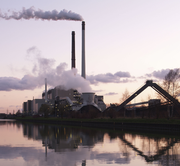Emissions trading
From Wikipedia, the free encyclopedia
Emissions trading (or emission trading) is an administrative approach used to control pollution by providing economic incentives for achieving reductions in the emissions of pollutants. It is sometimes called cap and trade.
A central authority (usually a government or international body) sets a limit or cap on the amount of a pollutant that can be emitted. Companies or other groups are issued emission permits and are required to hold an equivalent number of allowances (or credits) which represent the right to emit a specific amount. The total amount of allowances and credits cannot exceed the cap, limiting total emissions to that level. Companies that need to increase their emission allowance must buy credits from those who pollute less. The transfer of allowances is referred to as a trade. In effect, the buyer is paying a charge for polluting, while the seller is being rewarded for having reduced emissions by more than was needed. Thus, in theory, those who can easily reduce emissions most cheaply will do so, achieving the pollution reduction at the lowest possible cost to society.[1]
There are active trading programs in several pollutants. For greenhouse gases the largest is the European Union Emission Trading Scheme.[2] In the United States there is a national market to reduce acid rain and several regional markets in nitrogen oxides.[3] Markets for other pollutants tend to be smaller and more localized.
Contents[hide] |




No comments:
Post a Comment